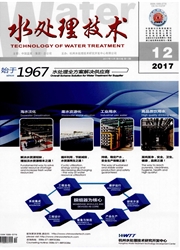

 中文摘要:
中文摘要:
以梧桐落叶有机物为实验对象,研究不同氯胺消毒条件下亚硝氮在卤代硝基甲烷(HNMs)形成中的作用,从而识别其关键影响因子。结果表明,亚硝氮的加入对梧桐落叶有机物氯胺化过程中HNMs的形成有明显的促进作用,而且在高氯胺含量、非中性(酸性或碱性)及低温条件下促进作用更为明显。由极差分析得知,影响亚硝氮进入HNMs分子的最大影响因子是p H,其次是氯胺含量,反应时间影响最小。HNMs的分布以三卤硝基甲烷(以TCNM为代表)为主,二卤硝基甲烷(以DCNM为代表)为辅,一卤硝基甲烷(以CNM为代表)则均没有检测到。其中三卤硝基甲烷的相对含量随着氯胺含量的增多、时间的延长、温度的上升而增加,但随着p H的上升而降低。
 英文摘要:
英文摘要:
The function of nitrite nitrogen in the formation of halonitromethanes (HNMs) during chloramination of organic matter made from the falling leaves of phoenix trees was investigated to recognize the key factor. The results showed that the nitrite nitrogen could enhance the formation of HNMs greatly, and the promotion of HNMs yields was significantly more obvious under the conditions of high chloramine dose, acid/basic condition and the low temperature. Range analysis revealed that pH value was the most important factor influencing the nitrite nitrogen promoting HNMs formation, followed by the dose of chloramine, and the reaction time. In addition, the dominant HNMs species was trihalonitromethane (TCNM), dihalonitromethane (DCNM) was minor, and the chloronitromethane (CNM) was not detectable. The percentage yields of TCNM was generally increased with the chloramine dose, reaction time and temperature increasing, yet decreased with the pH value increasing.
 同期刊论文项目
同期刊论文项目
 同项目期刊论文
同项目期刊论文
 Effects of ozone pretreatment on the formation of disinfection by-products and its associated bromin
Effects of ozone pretreatment on the formation of disinfection by-products and its associated bromin A new insight into membrane fouling mechanism in submerged membrane bioreactor: Osmotic pressure dur
A new insight into membrane fouling mechanism in submerged membrane bioreactor: Osmotic pressure dur Factors affecting formation of haloacetonitriles and haloketones during chlorination/monochloraminat
Factors affecting formation of haloacetonitriles and haloketones during chlorination/monochloraminat Properties of sediment NOM collected from a drinking water reservoir in South China, and its associa
Properties of sediment NOM collected from a drinking water reservoir in South China, and its associa 期刊信息
期刊信息
